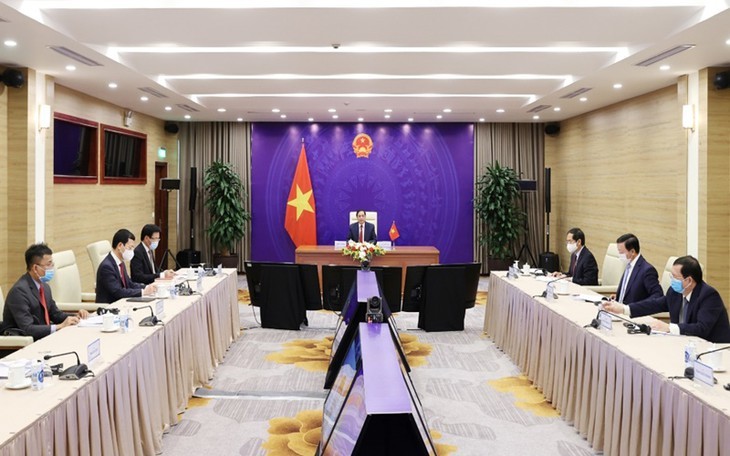(VOVWORLD) - Asian leaders attending the Future of Asia virtual conference last week agreed on the need to cooperate in the COVID-19 fight and post-pandemic economic recovery. The result will lay a foundation for future sustainable and inclusive development.
 Vietnamese Prime Minister Pham Minh Chinh attends the Future of Asia conference from Vietnam. (photo: Ministry of Foreign Affairs) Vietnamese Prime Minister Pham Minh Chinh attends the Future of Asia conference from Vietnam. (photo: Ministry of Foreign Affairs) |
The Future of Asia conference was organized by Nikkei Inc. on May 20th and 21st, in the middle of a spreading COVID-19 pandemic that is impacting the economy and people’s lives in every country.
Setting aside differences to surmount the pandemic
Participants agreed that the COVID-19 pandemic has exposed problems in Asia, including development gaps in institutional, infrastructure, and technology, and traditional and non-traditional security issues like natural disasters, environmental pollution, and climate change.
The pandemic has transformed economic orders and structures, global management methods, economic operation modes, and the global socio-economy. It’s time for countries to set aside their differences, unite, and help each other overcome the pandemic.
Lao Party General Secretary and President Thongloun Sisoulith delivered a speech entitled “Economic recovery through technological cooperation”, which highlighted the importance of cooperation and consensus in the fight against COVID-19. He said Asian countries must work together to advance. Philippines’ President Rodrigo Duterte called for global cooperation, including equal access to COVID-19 vaccines. He said that without global collaboration, the de-globalisation process will lead to the loss of trade opportunities for developing countries.
Malaysian Prime Minister Muhyiddin Yassin said Asia should lead the way in opening up patent protection to produce cheaper generic versions of life-saving medicines for critical diseases, from Covid-19 to HIV/AIDS. For Asia to effectively fight pandemics, he said, it needs to shift from a purely nationalistic approach to health services to investing in health as a global public good.
Thai Prime Minister Prayuth Chan-ocha called on world leaders to start thinking of COVID-19 vaccines as “global common goods.”
Japanese Prime Minister Yoshihide Suga pledged to continue efforts to ensure equitable access to safe and effective vaccines for developing countries. He said during next month’s virtual summit on COVID-19 vaccines, he will call on every country to provide free vaccines to countries in need. Japan will help build cold storage systems for vaccine transport.
Setting up new cooperative frameworks
The Asian leaders highlighted the need to establish new cooperative frameworks for post-pandemic recovery. Vietnamese Prime Minister Pham Minh Chinh said Asia needs a new cooperative framework to survive the COVID-19 pandemic and solidify a foundation for future sustainable and inclusive development across the continent. He proposed 6 areas for cooperation: developing infrastructure aimed at stimulating economic growth, accelerating fair and effective economic integration and connectivity, strengthening science and technology, promoting sustainable green growth, fighting COVID-19 and improving public healthcare and social welfare systems, and ensuring a peaceful and stable international environment conducive to development.
Pakistani Prime Minister Imran Khan shared the view, saying in his presentation, entitled “The Asian integration path” that regional stability is a prerequisite for economic recovery and development and Pakistan wants to build cooperative and peaceful relations with all its neighbors and resolve disputes through dialogue.
Indian Foreign Minister Subrahmanyam Jaishankar recommended diversifying supply chains to avoid a recurrence of a problem that occurred during the pandemic – countries breaking commitments and limiting exports, which led to a shortage of essential goods.
Major Asian countries agreed that cooperation is needed to overcome the difficulties and challenges of the pandemic.
The important work now is to establish new cooperative frameworks for the post pandemic period.